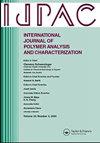Disordered peptide-based design of intrinsically disordered polymers for biomedical applications
IF 1.6
4区 工程技术
Q4 POLYMER SCIENCE
International Journal of Polymer Analysis and Characterization
Pub Date : 2025-04-03
DOI:10.1080/1023666X.2025.2458470
引用次数: 0
Abstract
In the fields of biology and medicine, the development of synthetic polymers that emulate the unique conformational characteristics of intrinsically disordered proteins (IDPs) is of significant interest due to their exceptional structural and conformational versatility. The inherent flexibility of IDPs, arising from their absence of stable three-dimensional structures, enhances their capacity for self-organization, thereby rendering them advantageous for diverse biomedical applications. Intrinsically disordered synthetic polymers hold considerable promise in areas such as drug delivery systems, organ transplantation, artificial organ design, and immune system compatibility. However, advancing the synthesis and characterization methodologies for these polymers, which are derived from the properties of IDPs, remains a critical challenge. This article presents our design strategies for creating intrinsically disordered synthetic polymers tailored for biomedical use. These design methodologies are informed by the attributes of intrinsically disordered proteins and incorporate disorder-promoting oligopeptides.
基于无序肽的内在无序聚合物生物医学应用设计
在生物学和医学领域,模仿内在无序蛋白(IDPs)独特构象特征的合成聚合物的发展由于其特殊的结构和构象的多功能性而引起了人们的极大兴趣。国内流离失所者由于缺乏稳定的三维结构而具有固有的灵活性,这增强了他们自我组织的能力,从而使他们有利于各种生物医学应用。内在无序的合成聚合物在药物输送系统、器官移植、人工器官设计和免疫系统相容性等领域具有相当大的前景。然而,推进这些聚合物的合成和表征方法仍然是一个关键的挑战,这些聚合物来源于IDPs的性质。这篇文章提出了我们的设计策略,创造本质上无序的合成聚合物量身定制的生物医学用途。这些设计方法是由本质上无序的蛋白质的属性通知,并纳入无序促进寡肽。
本文章由计算机程序翻译,如有差异,请以英文原文为准。
求助全文
约1分钟内获得全文
求助全文
来源期刊
CiteScore
3.50
自引率
5.30%
发文量
37
审稿时长
1.6 months
期刊介绍:
The scope of the journal is to publish original contributions and reviews on studies, methodologies, instrumentation, and applications involving the analysis and characterization of polymers and polymeric-based materials, including synthetic polymers, blends, composites, fibers, coatings, supramolecular structures, polysaccharides, and biopolymers. The Journal will accept papers and review articles on the following topics and research areas involving fundamental and applied studies of polymer analysis and characterization:
Characterization and analysis of new and existing polymers and polymeric-based materials.
Design and evaluation of analytical instrumentation and physical testing equipment.
Determination of molecular weight, size, conformation, branching, cross-linking, chemical structure, and sequence distribution.
Using separation, spectroscopic, and scattering techniques.
Surface characterization of polymeric materials.
Measurement of solution and bulk properties and behavior of polymers.
Studies involving structure-property-processing relationships, and polymer aging.
Analysis of oligomeric materials.
Analysis of polymer additives and decomposition products.

 求助内容:
求助内容: 应助结果提醒方式:
应助结果提醒方式:


